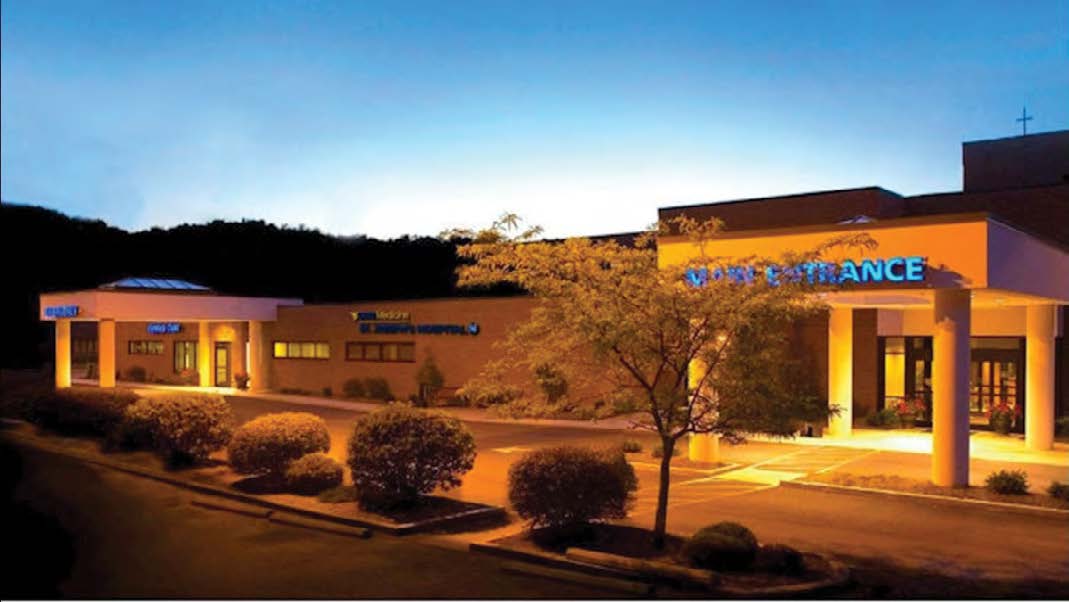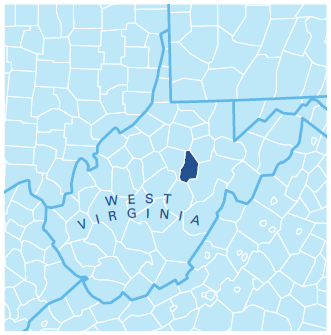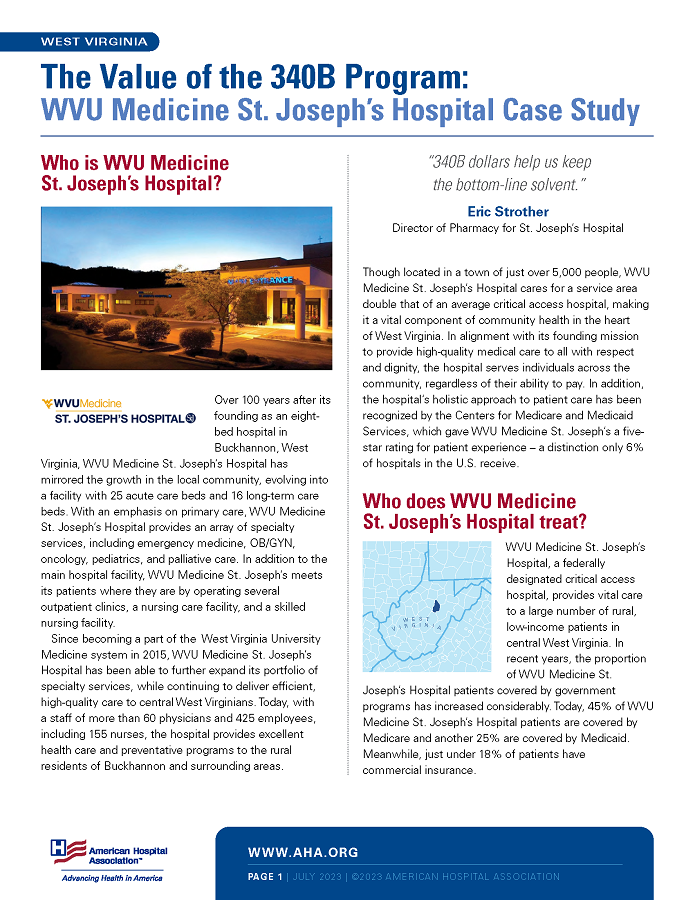

WVU Medicine St. Joseph’s Hospital | West Virginia
The Value of the 340B Program Case Study
Who is WVU Medicine St. Joseph’s Hospital?

 Over 100 years after its founding as an eight-bed hospital in Buckhannon, West Virginia, WVU Medicine St. Joseph’s Hospital has mirrored the growth in the local community, evolving into a facility with 25 acute care beds and 16 long-term care beds. With an emphasis on primary care, WVU Medicine St. Joseph’s Hospital provides an array of specialty services, including emergency medicine, OB/GYN, oncology, pediatrics, and palliative care. In addition to the main hospital facility, WVU Medicine St. Joseph’s meets its patients where they are by operating several outpatient clinics, a nursing care facility, and a skilled nursing facility.
Over 100 years after its founding as an eight-bed hospital in Buckhannon, West Virginia, WVU Medicine St. Joseph’s Hospital has mirrored the growth in the local community, evolving into a facility with 25 acute care beds and 16 long-term care beds. With an emphasis on primary care, WVU Medicine St. Joseph’s Hospital provides an array of specialty services, including emergency medicine, OB/GYN, oncology, pediatrics, and palliative care. In addition to the main hospital facility, WVU Medicine St. Joseph’s meets its patients where they are by operating several outpatient clinics, a nursing care facility, and a skilled nursing facility.
Since becoming a part of the West Virginia University Medicine system in 2015, WVU Medicine St. Joseph’s Hospital has been able to further expand its portfolio of specialty services, while continuing to deliver efficient, high-quality care to central West Virginians. Today, with a staff of more than 60 physicians and 425 employees, including 155 nurses, the hospital provides excellent health care and preventative programs to the rural residents of Buckhannon and surrounding areas.
Though located in a town of just over 5,000 people, WVU Medicine St. Joseph’s Hospital cares for a service area double that of an average critical access hospital, making it a vital component of community health in the heart of West Virginia. In alignment with its founding mission to provide high-quality medical care to all with respect and dignity, the hospital serves individuals across the community, regardless of their ability to pay. In addition, the hospital’s holistic approach to patient care has been recognized by the Centers for Medicare and Medicaid Services, which gave WVU Medicine St. Joseph’s a five-star rating for patient experience – a distinction only 6% of hospitals in the U.S. receive.
“340B dollars help us keep the bottom-line solvent.”
Eric Strother
Director of Pharmacy for St. Joseph’s Hospital
Who does WVU Medicine St. Joseph’s Hospital treat?
 WVU Medicine St. Joseph’s Hospital, a federally designated critical access hospital, provides vital care to a large number of rural, low-income patients in central West Virginia. In recent years, the proportion of WVU Medicine St. Joseph’s Hospital patients covered by government programs has increased considerably. Today, 45% of WVU Medicine St. Joseph’s Hospital patients are covered by Medicare and another 25% are covered by Medicaid. Meanwhile, just under 18% of patients have commercial insurance.
WVU Medicine St. Joseph’s Hospital, a federally designated critical access hospital, provides vital care to a large number of rural, low-income patients in central West Virginia. In recent years, the proportion of WVU Medicine St. Joseph’s Hospital patients covered by government programs has increased considerably. Today, 45% of WVU Medicine St. Joseph’s Hospital patients are covered by Medicare and another 25% are covered by Medicaid. Meanwhile, just under 18% of patients have commercial insurance.
What’s the value of the 340B Program for WVU Medicine and its patients?
Through participation in the 340B Drug Pricing Program, WVU Medicine St. Joseph’s Hospital has been able to build on its legacy as a trusted community provider. Specifically, the 340B program has enabled WVU Medicine St. Joseph’s Hospital to expand its specialty services and maintain its workforce, including:
Infusion and Oncology Services
Prior to participation in the 340B program, inadequate government reimbursements threatened the financial viability of infusion and oncology services at WVU Medicine St. Joseph’s Hospital. With 340B program savings, however, the hospital has been able to keep the doors of its infusion center open and continue offering oncology services, helping rural residents in the area avoid traveling to Bridgeport or Morgantown, West Virginia to access needed care.
Consistent Staffing
The 340B program has been pivotal in helping WVU Medicine St. Joseph’s Hospital maintain consistent staffing levels and ensure patient access to services in the local community. While the health care workforce shortage has forced many nearby hospitals to cut back on patient services, WVU Medicine St. Joseph’s Hospital has used 340B savings to avoid reducing staffing, beds or closing units. For example, the 340B program has helped WVU Medicine St. Joseph’s Hospital continue to provide labor and delivery services, while other hospitals have been forced to cut back on women’s health services due to inconsistent staffing. As a result, WVU Medicine St. Joseph’s Hospital is proud to be the primary provider of labor and delivery services in Upshur County and the surrounding counties.
Prescription Access Programs
Through the 340B savings, WVU Medicine St. Joseph’s Hospital has been able to bolster its prescription assistance program, which provides prescriptions at no cost for those who are not able to pay for the medication or are experiencing a lapse in insurance. This program helps ensure that low-income patients can access the medications their doctors provide and works to boost medication adherence.
340B Hospitals Need Support
The 340B Drug Pricing Program has been critical to WVU Medicine St. Joseph’s Hospital’s success in making measurable differences in the rural community of Buckhannon and beyond. WVU Medicine St. Joseph’s Hospital uses 340B savings to provide medications at a reduced cost, or for free, and reinvest in patient care.
Given its rural location, WVU Medicine St. Joseph’s Hospital relies on a network of community and specialty pharmacies to provide essential medication to its patients. However, recent actions by drug manufacturers to place burdensome limitations on WVU Medicine St. Joseph’s Hospital, including restricting discounts to one contract pharmacy in their network that must be located within 40 miles of their campus, has created significant financial challenges. The hospital estimates it will lose over half a million dollars per year that could be put toward community care (the entire WVU Medicine system reports approximately $39 million in annual losses as a result of these drug company actions). For any provider, let alone a rural hospital, that represents a lot of money that could help maintain access to care for its patients. Ultimately, these unnecessary financial burdens will lead to the reduction or elimination of services across West Virginia, as health facilities rely on relationships with community pharmacies to meet the unique needs of patients.
It’s rural patients and community members who will bear the consequences of onerous changes to the 340B program, which has a long track record across the country and in West Virginia of providing significant benefits for communities for over 30 years. The 340B Drug Pricing Program must be preserved to ensure hospitals like WVU Medicine St. Joseph’s can continue to support compassionate, high-quality care.


